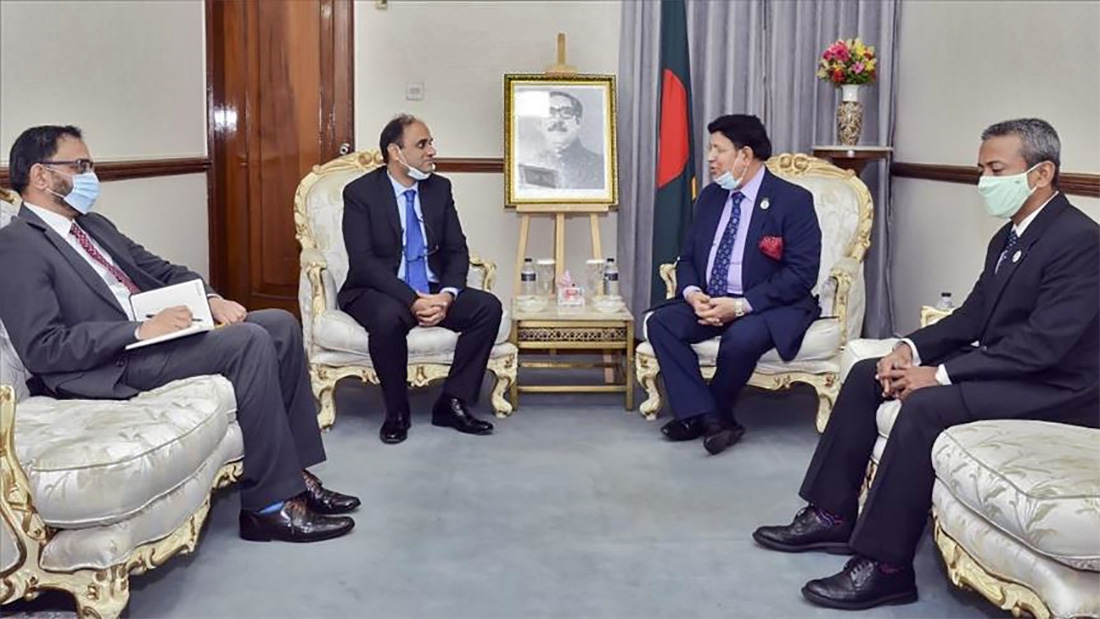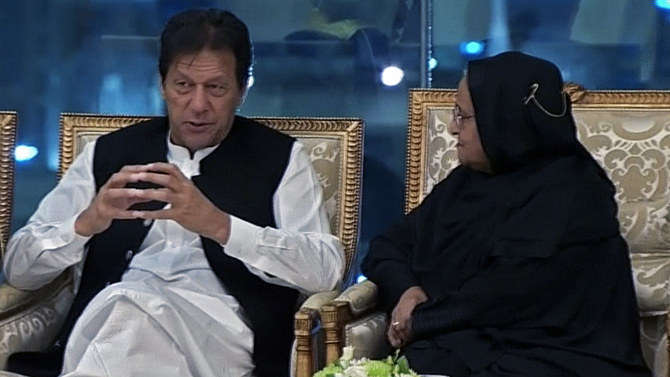ISLAMABAD/ DHAKA: As India’s relations with its neighbors in the South Asian region deteriorate, old foes Pakistan and Bangladesh are making a push to build diplomatic, economic and cultural ties that could upend decades of historic configurations in the region, officials and experts in Islamabad and Dhaka have said.
Indeed, a number of recent diplomatic developments have hinted at a thaw in a long-troubled Pakistan-Bangladesh equation.
Prime Minister Imran Khan invited his Bangladeshi counterpart Sheikh Hasina to visit Islamabad in a rare call earlier this month that came just weeks after a ‘quiet’ meeting between Pakistan’s high commissioner to Dhaka, Imran Ahmed Siddiqui, and Bangladeshi Foreign Minister A. K. Abdul Momen.
Relations between the two countries have never recovered from the 1971 war when Bengali nationalists, backed by India, broke away from what was then West Pakistan to form a new country.
Ties reached a new low in 2016 when Bangladesh executed several leaders of its Jamaat-e-Islami party on charges of committing war crimes in 1971. Pakistan called the executions and trials “politically motivated,” arguing that they were related to the pro-Pakistan stance of the convicts during the war.
But now, officials on both sides say it’s time for a reset.
“We look forward to having a sustained dialogue with the government of Bangladesh on how best our bilateral relations can move forward on a positive trajectory,” Pakistan’s foreign office spokesperson Aisha Farooqui told Arab News on Thursday. “We hope to work and take forward our relations, whether its trade, culture and all other mutual areas.”
Ambassador Siddiqui declined to give details of his meeting with Momen but told Arab News the aim of the huddle was “to further promote bilateral relations with a forward-looking approach” given a desire from both sides to strengthen ties, particularly through private sector partnerships.
“The younger generation is especially keen to forge meaningful ties. There is a huge potential in bilateral economic and commercial cooperation,” he said. “The two sides may work together to realize this potential with a focus on bringing our respective private sectors closer.”
Mohammad Ruhul Alam Siddique, Bangladesh’s high commissioner-designate to Pakistan, also said he aimed to improve trade and commercial ties between the two nations during his tenure.
“My only mission will be to better the bilateral relations as much as possible while delivering services in Pakistan,” he said, saying his first task in the coming weeks would be to reduce the trade imbalance between the two countries.

Pakistan's High Commissioner in Dhaka Imran Ahmed Siddiqui, left, meets Bangladeshi Foreign Minister AK Abdul Momen, right, in Dhaka, Bangladesh, on July 1, 2020. (Pakistan High Commission)
According to the State Bank of Pakistan, Pakistan’s exports to Bangladesh reached $736 million in 2019, while Bangladesh’s exports to Pakistan were only $44 million.
Pakistan and Bangladesh’s embrace comes at a time when relations between India and many countries in the region are unraveling.
Last month, the Indian army said at least 20 of its soldiers were killed after hand-to-hand fighting with Chinese troops at a disputed border site, the deadliest clash in decades.
India also has increasingly tense ties with Nepal over disputed land, about 372 square km (144 square miles), strategically located at the tri-junction between Nepal, India and the Tibet region of China. India has kept a security presence in the area since a border war with China in 1962.
Pakistan and India have also warred for decades over the disputed Kashmir region, which both claim in full and rule in part.
“We see there are problems [of India] with China in the border region, problems with Nepal, some problems with Bangladesh as well, and of course, with Pakistan on Jammu and Kashmir,” Farooqui of the Pakistani foreign office said. “These policies do not make India effective for peace and stability in the region.”

Pakistan's High Commissioner in Dhaka Imran Ahmed Siddiqui, second left, meets Bangladeshi Foreign Minister AK Abdul Momen, second right, in Dhaka, Bangladesh, on July 1, 2020. (Pakistan High Commission)
Explaining the context of a reset in Pakistan-Bangladesh ties, Pakistani prime minister’s special adviser on security, Moeed Yusuf, said in a veiled reference to India: “The context is very clear: there is one country that is threatening, annoying and upsetting all its neighbors.”
In response to an email from Arab News, the spokesperson of the Indian high commission in Islamabad, Vipul Dev, referred to a statement by the spokesperson of the Indian External Affairs Ministry last week after the Pakistani PM’s call to Hasina, saying India’s relationship with Bangladesh was “time tested and historic.”
“This year both countries are taking lot of steps to strengthen this partnership,” the ministry spokesperson said.
Despite enduring ties between India and Bangladesh, experts say Islamabad must continue to push its rapprochement with Dhaka, still in its infancy, forward.
“Now it’s Pakistan’s responsibility to rebuild the relationship,” international relations expert Prof. Delwar Hossain said.
For this, Pakistan’s former high commissioner to India Abdul Basit said, the Pakistani prime minister needed to “follow up” on his call to his Bangladeshi counterpart.
“Prime Minister Imran Khan should write a formal invitation to his Bangladeshi counterpart which will help keep the momentum going,” Basit said, adding that a special envoy to Dhaka should be appointed, like Pakistan had recently done for Kabul.
#Pakistan premier #ImranKhan should send formal invitation to his #Bangladeshi counterpart Hasina Wajid as goodwill gesture, suggests @abasitpak1, adding reviving ties can also benefit #Bangladesh from #CPEC.
–
Full story by @iSaimaShabbir & Shehab Sumon: https://t.co/K0X4ZxUKo0 pic.twitter.com/kGbyWuznt4— Arab News Pakistan (@arabnewspk) August 1, 2020
“We should focus more on working behind the scenes to avoid unnecessary hype,” Basit said. “It should be a consistent process.”
















